What can I do with a degree in Chemistry?
The job opportunities available to graduates with a degree in chemistry are as far-reaching as the subject itself. In industries involving chemicals, plastics, pharmaceuticals, food, textiles and timber, there are many opportunities for employment, working in areas such as research and development, quality control, marketing, sales or management.
In addition, chemists play a leading role in agriculture, horticulture, fisheries, water quality control, in chemical, biochemical, and medical research units, and in the public sector, covering such areas as pollution monitoring, water purification and forensic work solving criminal cases.
Recent changes in environmental, occupational health and safety legislation have resulted in increased employment opportunities in both the public sector and industry. Additionally, the shortage of chemistry teachers is a perennial one, and chemistry graduates are in continual demand for commerce-related positions.
Chemistry trains you to handle information and to deal with complex concepts. These are qualities sought after by many different employers and chemists can be found in areas as diverse as finance, law, politics and retailing.
The University Career Development Centre is very useful when looking to apply for jobs.
Recent Chemistry Graduates
Adelaide Johnston - BSc in Chemistry
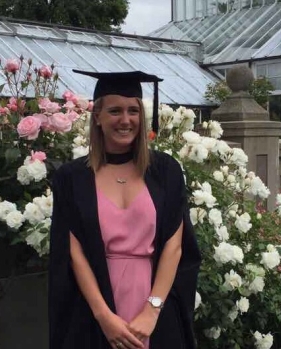 Adelaide completed a BSc in Chemistry. She found it daunting to pick what to study at university, so chose Chemistry as it was one of her best subjects and also one that she enjoyed. Adelaide is originally from Haast on the West Coast, but went to boarding school in Dunedin and loved the city. She applied and was accepted into the Forensics Science programme at another university but she just couldn't bring herself to leave Dunedin, and she has never regretted her decision to stay! Plus she managed to do all of the forensics papers Otago offered alongside her chemistry degree so it was a win win.
Adelaide completed a BSc in Chemistry. She found it daunting to pick what to study at university, so chose Chemistry as it was one of her best subjects and also one that she enjoyed. Adelaide is originally from Haast on the West Coast, but went to boarding school in Dunedin and loved the city. She applied and was accepted into the Forensics Science programme at another university but she just couldn't bring herself to leave Dunedin, and she has never regretted her decision to stay! Plus she managed to do all of the forensics papers Otago offered alongside her chemistry degree so it was a win win.
Adelaide's favourite paper was CHEM304: Environmental Chemistry. “I have always been interested in the environment and conservation. The idea of being able to combine new knowledge on how aspects of the environment worked with actually modelling it and calculating outcomes really appealed to me. It was made even more interesting because I also completed some of the Environmental Studies papers at Otago. I found it aided my understanding, so I could not only say, 'well this is happening to the ocean and it is having a negative impact,' but actually learn why it was having that effect and how it impacts certain organisms. It was also amazing to get out and about and participate in field trips like the boat trip in the Otago Harbour. It was really satisfying analysing and presenting data that I had collected with my own hands. The practical aspect really appealed to me, I just loved getting out there and doing it!”
Adelaide is currently a laboratory analyst for Zenith Technology in Dunedin. The tasks in this role vary depending on the project, but all link very directly to her degree in chemistry because it is using many of the same techniques and equipment that were used in many of her chemistry labs during her studies. “I think the amount of hands on time you get in the lab at Otago helps to prepare you for any kind of lab job. It makes you much more confident going into a new lab when you are able to recognise a lot of the equipment, its purpose, and how to use it. Things that are actually quite a comfort when you are in an unfamiliar lab”.
“My job is perfect for me because I get a lot of time in the lab, but I also spend a lot of time working with people which is something I really love doing. Zenith Technology runs drug trials on medicines, so I have been taught how to venepuncture, carry out ECGs, take bloods via a cannula and do vitals on the subjects who come in to do these drug trials. I never thought my chemistry degree could lead me into learning all of these new skills but it's really amazing how chemistry can open up so many doors. That's what I love about my job, the balance between the full on chemistry side of things in the lab, and the hands on interacting with the trial subjects”.
Daniel Spence - BSc in Chemistry
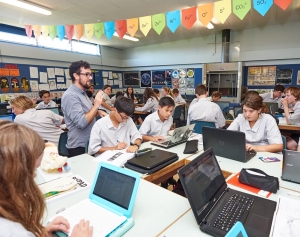 Daniel Spence chose to study Chemistry because of a unique and inspiring Chemistry teacher - Mrs Callow. She made such an impression on Daniel that he decided he wanted to follow in her footsteps. “She told me that, as a teacher, she'd been many things, but she'd never been bored. That sounded like me.”
Daniel Spence chose to study Chemistry because of a unique and inspiring Chemistry teacher - Mrs Callow. She made such an impression on Daniel that he decided he wanted to follow in her footsteps. “She told me that, as a teacher, she'd been many things, but she'd never been bored. That sounded like me.”
When Daniel came to visit the University of Otago he was immediately sold on the feel of the place. “The beautiful old buildings and cheerful people created such a welcoming atmosphere. I already knew what I wanted to study, so I was just picking a place where I would feel at home. I ended up living in Dunedin for six year completing both a BSc and MTchgLn.”
While in Otago, Daniel got involved in the Department of Chemistry's Outreach programme. “We would go to primary and intermediate schools and get students excited and enthused about science. We did lots of cool things, like making fizz with dry ice, ice cream with liquid nitrogen. This was definitely the best part about my degree at Otago. As I was an aspiring teacher Dave Warren also gave me the opportunity (and a car) to go to Waitaki Girls High School to teach part of a spectroscopy unit to Year 13 students. Not something I would have been able to achieve on my own”.
Daniel is now a Science and Chemistry teacher on the Kāpiti Coast. He has recently returned from a trip to Mexico through Operation Wallacea with 22 students. “We were so fortunate to work on the Yucatán peninsular doing ecological research both in the Calakmul jungle and Akumal beach. And this is within my first two years of teaching!”
In the future, Daniel is keen to take groups of students on more expeditions with Operation Wallacea, perhaps to Peru or Madagascar. He is also interested in exploring further opportunities with Environmental education. Daniel is also thinking about making the most of teaching's versatility by working at an international school in a Spanish-speaking country.
Smita Ghosh - PhD in Chemistry
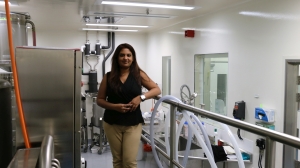 Chemistry always fascinated Smita. Everything surrounding us is chemistry - be it the glowing fireflies, leaves changing colour in autumn or the colourful fireworks, stuff we use - soaps/shampoos / synthetic fabrics / plastic; stuff we eat - yoghurt, cheese, jelly etc. Chemistry unravels these little mysteries and help us to understand the world around us.
Chemistry always fascinated Smita. Everything surrounding us is chemistry - be it the glowing fireflies, leaves changing colour in autumn or the colourful fireworks, stuff we use - soaps/shampoos / synthetic fabrics / plastic; stuff we eat - yoghurt, cheese, jelly etc. Chemistry unravels these little mysteries and help us to understand the world around us.
Chemistry is a vast subject to choose from, but Smita's favourite area has always been Polymer Chemistry. Polymers are everywhere — from food, clothes, home and personal care products, leisure equipment, phones, vehicles to contact lenses and medical devices. Polymer gels, elastic material, tough polymer composites - these “smart” materials form an integral part of everyday life — and if they did not exist, many gadgets we use in our day to day life would not be possible. For Smita pursuing a PhD in polymer chemistry gave her a platform for exploration of this exciting world. Smita's PhD supervisor Prof Stephen Moratti and co-supervisor Prof Lyall Hanton were very supportive and encouraging throughout her PhD journey.
Whilst at Otago Smita made the most of the beautiful walking tracks around the city to explore the nature Dunedin has to offer. She also enjoyed the Unipol facilities on campus especially playing badminton.
Smita's PhD in Chemistry opened up wide career options for her. Smita is currently working as a Process Development Chemist in a production plant for Chitogel Limited in Wellington. Smita applies her acquired knowledge of chemistry to the manufacturing process of a polymer gel for use in Endoscopic Sinus surgery. “Every day is a new and exciting work challenge” Smita says “And I am looking forward to working on future R&D projects in this exciting area of surgical and medical devices made of polymers”.
Daniel Killeen - PhD in Chemistry
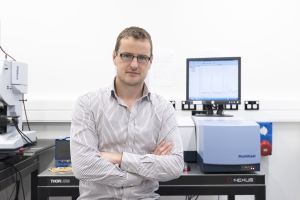 Daniel Killeen was convinced by a teacher in high school that chemistry was the most creative of the sciences. After completing his BSc(Hons) at the National University of Ireland, Galway, he worked as a technician with Allergan Pharmaceuticals for 5 years. This was much longer than he had originally planned! In 2011 Daniel's partner was offered a 3 year post-doc in the Microbiology department of Otago University and he jumped at the opportunity to pursue further education on the far side of the world. Daniel contacted the Chemistry department found a supervisor who had also worked in industry between his BSc. and PhD, and recognised the value of Daniel's practical experience. So Otago was chosen for him by other events, but he couldn't have been happier with how things turned out.
Daniel Killeen was convinced by a teacher in high school that chemistry was the most creative of the sciences. After completing his BSc(Hons) at the National University of Ireland, Galway, he worked as a technician with Allergan Pharmaceuticals for 5 years. This was much longer than he had originally planned! In 2011 Daniel's partner was offered a 3 year post-doc in the Microbiology department of Otago University and he jumped at the opportunity to pursue further education on the far side of the world. Daniel contacted the Chemistry department found a supervisor who had also worked in industry between his BSc. and PhD, and recognised the value of Daniel's practical experience. So Otago was chosen for him by other events, but he couldn't have been happier with how things turned out.
Daniel's PhD research combined two very different aspects of chemistry: natural products chemistry and physical chemistry, fields of research that are (largely) mutually exclusive. The styles of my supervisors were also very different, one had a classical scientific approach whereas the other encouraged a freer style of exploratory experimentation. Daniel learned an enormous amount from both supervisors and still collaborates with them.
Daniel got into trail running in his first few years. The Ross Creek-Pineapple Track-Flagstaff area is right on the fringe of the University and has incredible scenery. He also played football with Dunedin Technical F.C. and surfed. If you can tolerate the cold water, Dunedin is probably one of the best surf locations in the world. Consistent waves, enormous variety of spots and relatively uncrowded. Daniel often had world-class breaks like Aramoana and Karitane all to himself.
Daniel now works in Nelson in the Marine Product group with the NZ Institute for Plant & Food Research. The institute employs about 1000 people at various sites throughout NZ and is responsible for maintaining and developing NZ plant and food resources. His job involves working closely with industrial marine oil companies, but he is also given freedom to pursue some of his own research interests, particularly developing rapid, spectroscopic methods for the analysis of marine products.
“I'm fortunate enough to work in a role that is directly related to my undergraduate and PhD studies. The analytical and organisational skills I developed throughout my PhD at Otago are of fundamental importance to performing effectively in this role” says Daniel. “In a more general sense, I feel like a degree in chemistry also improves critical thinking, logical thinking and communication skills, which would prove useful in any line of work. I work hard in whatever role I am in and keep my eyes open for new opportunities. As long as I can keep learning new stuff and carve out time to do research, I'll be happy!”
Parag Dhake - PhD in Chemistry
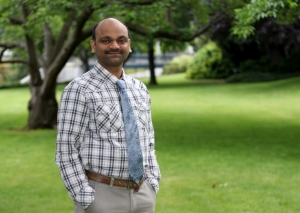 Parag came to the University of Otago as an International student. His supervisors, Associate Professor Stephen Moratti and Professor Lyall Hanton, gave him an opportunity to join the PhD programme based on his previous research experience and not solely on his academic grades.
Parag came to the University of Otago as an International student. His supervisors, Associate Professor Stephen Moratti and Professor Lyall Hanton, gave him an opportunity to join the PhD programme based on his previous research experience and not solely on his academic grades.
“My topic of study 'Supramolecular chemistry' gave me a whole new fascinating perspective of looking at the world of chemistry. With respect to my current work which involves making new materials from wool, the supramolecular chemistry can be seen in action in various ways such as keratin proteins, their interaction, degradation and stability etc'.
Parag is currently working in wool research at Lincoln Agritech Ltd in Christchurch. Parag plans to continue to work in lab based research and apply all the experience and knowledge for developing future materials while keeping sustainability at the focal point.
